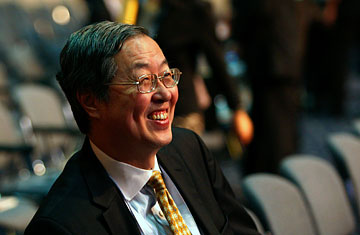
Chinese central bank governor Zhou Xiaochuan smiles before a working session of the 50th Inter-American Development Bank's (IADB) general assembly on March 30, 2009
The most effective weapons are often the ones never used. Just ask French President Nicolas Sarkozy. In advance of the G-20 summit held in London last week, Sarkozy threatened to storm out of the talks if hedge funds weren't put on a tight leash as part of efforts to cope with the global financial crisis. Leaders agreed to regulate hedge funds more tightly — and Sarkozy remained in his chair.
Now it is China's turn to show it's no pushover. In the G-20 run-up, Zhou Xiaochuan, China's central bank governor, published a paper suggesting that alternative global currencies, like Special Drawing Rights — a unit of exchange used by the International Monetary Fund — be considered to replace the U.S. dollar as the world's de facto reserve currency. While some Washington officials rejected the proposal as impractical, China's leaders have been taking steps to show just how nervous they are about a weaker dollar as the U.S. runs up massive deficits to shore up its crumbling economy and financial system. In the past two weeks, China signed multibillion-dollar currency-swap agreements with Indonesia and Argentina that effectively allow Beijing's two trading partners to bypass the dollar as a medium of exchange. The deals followed similar swaps China has hammered out over the past six months with Malaysia, Hong Kong and South Korea. The combined value of the various swaps — which enable the central banks of China's trading partners to sell yuan to local importers to buy Chinese goods — is nearly $100 billion. (See pictures of the global financial crisis.)
The agreements are an unusual step for China, which has historically used U.S. dollars to conduct its external trade. But with some 70% of its $2 trillion in foreign reserves parked in the U.S. currency, China is searching for ways to diversify. Beijing's main concern is that the dollar will inevitably weaken, eroding the value of its holdings, due to the growing U.S. budget deficit that is expected to swell to more than $1.75 trillion in 2009, the country's largest debt load as a percentage of GDP since World War II. "This is the tip of the iceberg," warns Joseph Tan, the chief Asia economist for private banking at Credit Suisse. "It doesn't look promising for the dollar." (Read "How China Is Capitalizing on the Economic Crisis.")
There have been other recent hassles with dollar-based trade. When U.S. financial institutions like AIG and Lehman Brothers began to disintegrate in 2008, global money markets were so roiled it became expensive for any trade to be done at all in dollars. "What precipitated [China's swap agreements] was the collapse of Lehman Brothers and the worries over trade financing at that time," says Johanna Chua, a regional economist with Citigroup in Hong Kong. "If the dollar is extremely volatile it costs more to hedge."
The swap agreements China has hashed out circumvent most of these problems. A Malaysian clothing store, for example, that buys shirts and dresses from China can now use its local currency, the ringgit, to pay for its purchases. Because it no longer has to pay a bank a fee to convert ringgit into dollars, transaction costs are reduced. Similarly, a Chinese company buying Malaysian palm oil can make its purchases in yuan. (Read about the economies of South Korea, Taiwan, Hong Kong and Singapore.)
There are significant drawbacks for companies taking this route, however. A Malaysian company accepting yuan as payment would have few reasons to hold the currency, which is not fully convertible. "Even if you could own the yuan through these swaps, what would you do with it?" asks Mark Matthews, a Hong Kong–based strategist for Fox-Pitt Kelton Securities. Yuan holders can invest their excess savings in Chinese securities, but only up to a point. The Chinese government said on Dec. 9 that it will triple the amount of domestic securities qualified foreign funds are allowed to purchase to up to $30 billion. But trillions of dollars can be sunk into secure U.S. Treasuries, which have no limits on foreign purchases.
Not surprisingly, the yuan agreements have so far drawn an indifferent response from the private sector. Intel, the world's largest semiconductor maker, has manufacturing facilities in both Malaysia and China. Yet so far Intel hasn't used the currency-swap facility Malaysia has in place with China. Much of Intel's internal trade is still transacted in dollars, according to Loo Cheng Cheng, a Penang-based corporate-affairs executive with Intel. According to Citigroup's Chua, companies in South Korea, which was the first to sign a swap facility with China, have so far also declined to utilize it. Indeed, even if it were used, the $26 billion facility could only absorb a fraction of the trade between South Korea and China, which totaled $168 billion in 2008.
So what is the point of China issuing all these swaps? "This is a contingency plan in case the dollar implodes," says Fox-Pitt Kelton's Matthews. "It is a way of continuing trade with its major trading partners." Other analysts say China is trying to assert itself, through words rather than deeds, on the global economic stage by taking a step toward making the yuan a global currency. "A lot of this is symbolic," says Citigroup's Chua. "China wants to be a player." And one sure way to be a player, as everyone knows, is to threaten to quit the game.
